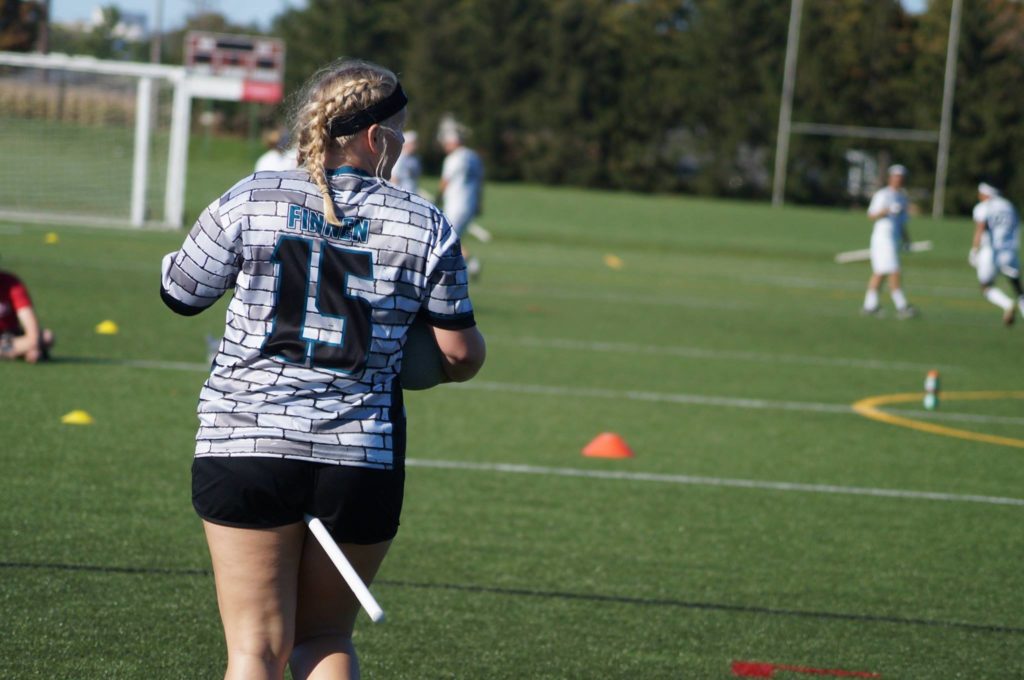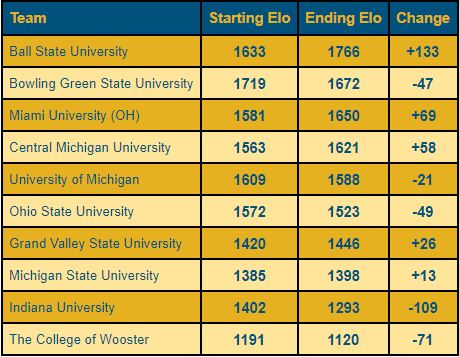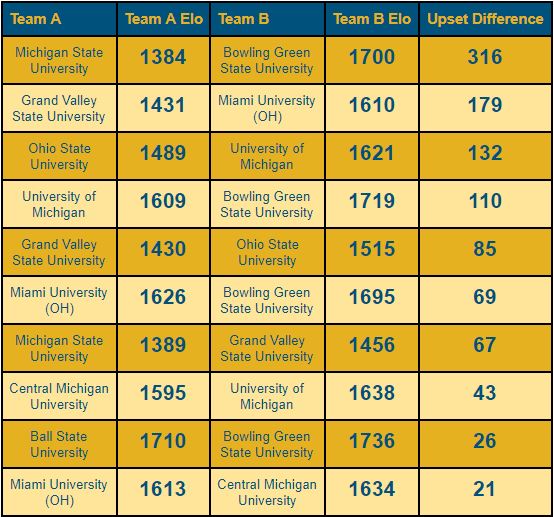Antwerp QC, Much of Belgian Core, Leaves Competitive Quidditch

Credit: Savannah Heller Photography
Bids for the Best
This weekend’s college Great Lakes Regional Championship brought us some of the most exciting gameplay we’ve seen so far this season. While Ball State University strolled their way to the trophy with a 9-0 record, the struggle for the next four bids was anything but straightforward. Ultimately, only two games separated second and eighth place in the standings, in a weekend filled with close games, upsets and uncertainty up until the last three games. Despite this, the round-robin format and USQ’s new tiebreaker system seemed to hold up their end of the bargain, allotting the Great Lakes’s five bids to the five best teams, according to our Elo ratings. Ball State University, Miami University (OH), Central Michigan University, University of Michigan and Bowling Green State University all came away with bids, and the table below shows that– by the end of the weekend–those teams had proved themselves as the best five to take them.

A Change for the Better
Prior to this weekend, Ohio University decided to transfer to the Mid-Atlantic, opting to go to the much closer North Huntingdon, Pa. over Kalamazoo, Mich. Regardless of any logistical considerations, however, this was almost certainly a good choice for the team to make, for their own good, and quidditch’s as a whole. Ohio’s Elo rating of 1516 would have put them as the seventh best team in the Great Lakes or the sixth best team in the Mid-Atlantic. Given that the Mid-Atlantic has 10 guaranteed bids while the Great Lakes have only five, Ohio’s attendance at the Great Lakes Regional Championship would have almost assuredly poached a bid from a better team or forfeited Ohio’s chances all together. At the Mid-Atlantic Regional Championship, however, their chances of qualifying are quite high. In addition to that, should they edge out a Mid-Atlantic team, that team will certainly be worse than any team that they could have taken a bid from in the Great Lakes–themselves, included. Ultimately, this means that Ohio’s decision to transfer not only gives them a better shot at qualifying, but gives USQ a more competitive pot of US Quidditch Cup qualifiers overall.
The Resiliency of the Round Robin
This weekend was home to a number of exciting upsets, most notably, Michigan State University’s 190*-180 victory over Bowling Green. That upset, and every other college upset that occurred this weekend, can be found in the table below along with their upset margins. Although each of the five teams that earned bids–besides Central Michigan and Ball State–were upset at some point, the round-robin format helped ensure that consistent play on their behalf still resulted in them earning bids. Had a standard bracket system been in place and one of those upsets happened, it is very possible that one or more of the best five teams in the Great Lakes would now be on the hunt for an at-large bid.

Perhaps the most important takeaway from this weekend is the extreme parity that exists in the college game. While Ball State came away with a 9-0 record, their game versus Central Michigan was tied before the catch, and they were down 10 to Miami when they caught against them. This weekend showed that almost any college team can beat any other, given the right conditions. Meanwhile, the community division contenders–Ohio Glory and Lake Erie Elite–are 12-0 against the college teams that attended this weekend, with only two of those wins being in snitch range (barely). Were it not for the college/community split, the narrative of this weekend would have very likely been how dominant those two teams were until they met in the finals, rather than being one of a competitive three-game series between them, and a spellbinding series of college upsets. Should this parity continue for other regions (and early results from the Northeast and Southwest seem to imply it will), we should be in for one of the most entertaining seasons of quidditch to date.
Archives by Month:
- May 2023
- April 2023
- April 2022
- January 2021
- October 2020
- September 2020
- July 2020
- May 2020
- April 2020
- March 2020
- February 2020
- January 2020
- December 2019
- November 2019
- October 2019
- August 2019
- April 2019
- March 2019
- February 2019
- January 2019
- November 2018
- October 2018
- September 2018
- August 2018
- July 2018
- June 2018
- April 2018
- March 2018
- February 2018
- January 2018
- November 2017
- October 2017
- July 2017
- June 2017
- May 2017
- April 2017
- March 2017
- February 2017
- January 2017
- December 2016
- November 2016
- October 2016
- September 2016
- August 2016
- July 2016
- June 2016
- May 2016
- April 2016
- March 2016
- February 2016
- January 2016
- December 2015
- November 2015
- October 2015
- September 2015
- August 2015
- July 2015
- June 2015
- May 2015
- April 2015
- March 2015
- February 2015
- January 2015
- December 2014
- November 2014
- October 2014
- September 2014
- August 2014
- July 2014
- May 2014
- April 2014
- March 2014
- February 2014
- January 2014
- November 2013
- October 2013
- September 2013
- August 2013
- July 2013
- June 2013
- May 2013
- April 2013
- March 2013
- February 2013
- January 2013
- December 2012
- November 2012
- October 2012
Archives by Subject:
- Categories
- Awards
- College/Community Split
- Column
- Community Teams
- Countdown to Columbia
- DIY
- Drills
- Elo Rankings
- Fantasy Fantasy Tournaments
- Game & Tournament Reports
- General
- History Of
- International
- IQA World Cup
- Major League Quidditch
- March Madness
- Matches of the Decade
- Monday Water Cooler
- News
- Positional Strategy
- Press Release
- Profiles
- Quidditch Australia
- Rankings Wrap-Up
- Referees
- Rock Hill Roll Call
- Rules and Policy
- Statistic
- Strategy
- Team Management
- Team USA
- The Pitch
- The Quidditch Lens
- Top 10 College
- Top 10 Community
- Top 20
- Uncategorized
- US Quarantine Cup
- US Quidditch Cup
